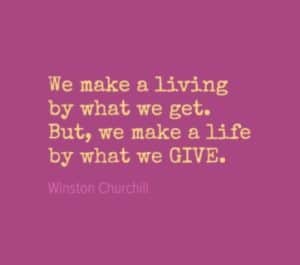 Nov. 13th was World Kindness Day (yes, that’s a thing). We are also entering the season of giving – Thanksgiving, #GivingTuesday and the all-important year-end giving appeals. Many of you are very busy asking folks to generously support your worthy cause. Keep this in mind as you refine your plans: One important reason WHY people give is because it feels really good. JetBlue’s Fly it Forward campaign is telling this story beautifully, and so does the scientific research on happiness. Let’s take a look.
Nov. 13th was World Kindness Day (yes, that’s a thing). We are also entering the season of giving – Thanksgiving, #GivingTuesday and the all-important year-end giving appeals. Many of you are very busy asking folks to generously support your worthy cause. Keep this in mind as you refine your plans: One important reason WHY people give is because it feels really good. JetBlue’s Fly it Forward campaign is telling this story beautifully, and so does the scientific research on happiness. Let’s take a look.
JETBLUE’S FLY IT FORWARD INITIATIVE

JetBlue’s Fly It Forward campaign does an excellent job of creating a meaningful, authentic experience for the giver and the receiver and then tells that story in a visually and emotionally powerful way. Bravo. Check out the video below here – you can really feel the love here. It’s palpable. Jet Blue did a great job of capitalizing on the #PayItForward mentality that is very relate-able and popular right now [Did you hear about that nearly 1,500 customers in a row that paid it forward at Starbucks in Connecticut?].
Is your organization providing compelling opportunities for your supporters to pay it forward this holiday season? Maybe it’s time to start your own chain reaction of kindness and generosity.

NOW, LET’S LOOK AT SOME SCIENCE BEHIND WHY IT FEELS SO DARN GOOD TO GIVE
The pursuit of happiness, America stands for it, and it’s a universal desire. This lovely video from Life Vest Inside showcases the science behind why we enjoy a “helpers high” when we give. Side Note: What a cool organization! They even have a Kindness Ambassador Program – love that!
- People that give donations or in-kind are 42% more likely to be happy. Source: Harvard “Social Capital Community Benchmark Survey”
- “Studies have shown that spending on others feels better than spending on yourself.” Source: Professor Elizabeth Dunn at UBC
- The hormone, oxytocin, induces feelings of warmth, euphoria and connection to others
BUT WAIT! THERE’S MORE!

- “The overarching conclusion is that donors feel happiest if they give to a charity via a friend, relative or social connection rather than simply making an anonymous donation to a worthy cause.” Source: PsychCentral: “How Giving Makes Us Happy” Looking for expert guidance and best practices, head over to peertopeerforum.org!
- Want to be happy? Stop being so cheap! Americans who describe themselves as “very happy” volunteer an average of 5.8 hours per month. Those who are “unhappy”? Just 0.6 hours. Source; The Paradox of Generosity, a new book by sociologists Christian Smith and Hilary Davidson presenting the findings of the Science of Generosity Initiative at Notre Dame, among the most comprehensive studies of Americans’ giving habits ever conducted.
Keep Maya Angelou’s wise words in mind as you go forth in your work to inspire people to donate to your cause and feel good doing it.
